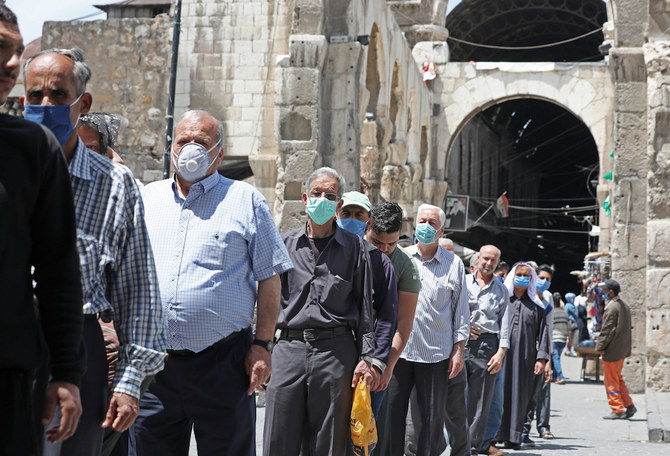LEEDS, UK: While the coronavirus pandemic and the Black Lives Matter protests in the West monopolize the global conversation, the plight of Syria’s civilian population seems to have been all but forgotten.
Trapped in a country devastated by 10 years of civil war, the lives of ordinary Syrians are being buffeted by a collapsing currency, medicine shortages, skyrocketing inflation and deepening poverty. And, by all accounts, the worst is yet to come.
As the Caesar Act, the tough new Syria-specific US legislation, entered into force on June 17, the official exchange rate for the dollar nearly doubled, jumping from 704 to 1,256 Syrian pounds.
The previous day, the black-market value had fallen sharply, with 2,950 Syrian pounds — instead of 2,850 — fetching $1.
The Caesar Act seeks not just to prevent members of President Bashar Assad’s inner circle from continuing to profit from the war, but also to hold them accountable for crimes against humanity.
While the ultimate objective may be to cut off Assad from Iran, Hezbollah and Russia and force him to share power with the opposition, regular people in Syria (and Lebanon) are already feeling the pinch.
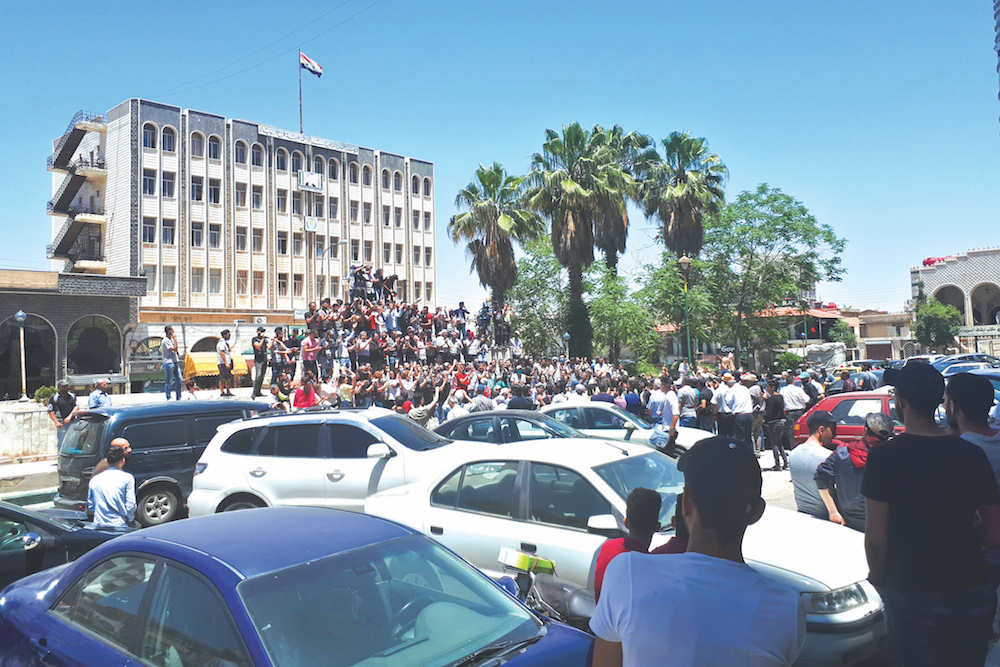
Syrians in Suwayda chant anti-government slogans as they protest the deteriorating economy and corruption. (AFP)
The Syrian exchange rate has been fluctuating since the beginning of June, forcing many shops in Damascus to put up the shutters as it becomes difficult for traders to set prices.
The latest shockwaves come even as the full impact of the coronavirus crisis on the economy is yet to be felt.
R.K., 54, a working-class mother of three, said she was sent home when the lockdowns started in March without her last salary.

Hyperinflation and an eroding currency mean a normal weekly wage now lasts three days for some Syrians. (AFP)
“If not for the money I received from friends abroad, I have no idea how my family would’ve survived, especially with my son being badly injured and my two daughters unemployed,” she told Arab News.
“We used my husband’s last paycheck to pay the rent, and were left with only a few potatoes and no cash.”
M.H., a 30-year-old resident of Damascus who works in drama productions, complained about the pernicious effects of stagnant and meager wages on top of an eroding currency and hyperinflation.
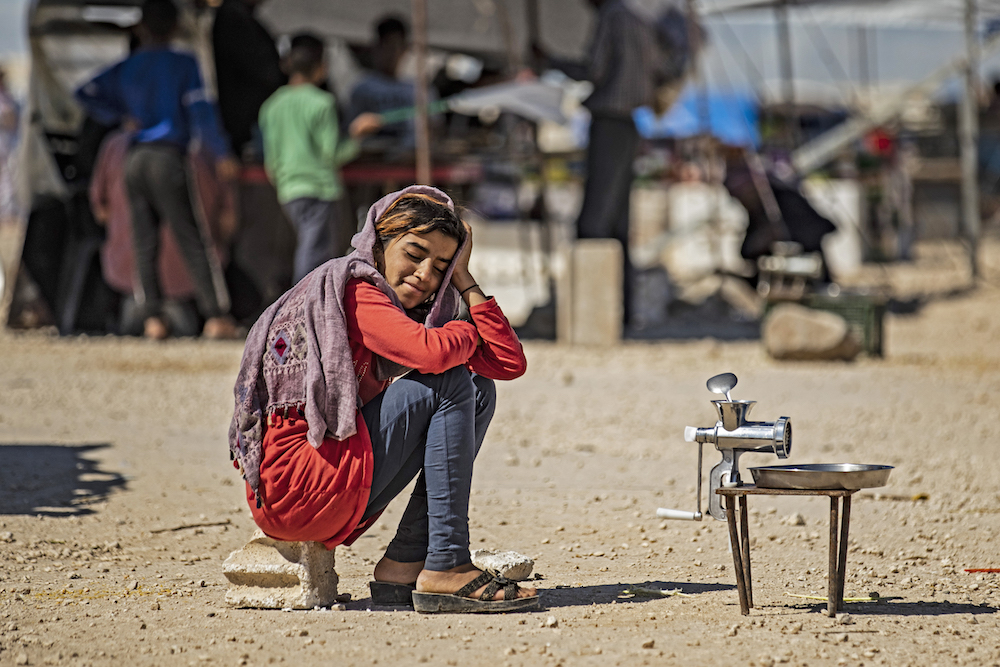
A displaced Syrian girl waits for customers bringing chickpeas to grind for a fee, at the Washukanni camp for the internally displaced in Syria's northeastern Hasakeh province on May 10, 2020. (AFP/File Photo)
“My salary lasted only a week or 10 days before the coronavirus lockdown. Now, although the lockdown has ended in Damascus, my salary barely lasts three days,” she told Arab News.
Referring to the Caesar Act, whose sanctions provisions are now fully in effect, she said she has no idea what to expect other than that “definitely, there will be no substantial pay raise.”
FASTFACTS
IN NUMBERS
- 44% Fall in Syrian pound’s value before sanctions
- 3x Rise in food prices in Syria in one year
M.H. summed up the prevailing mood of doom and gloom thus: “I suggest, instead of all these sanctions, which are slowly draining life out of people in Syria, how about they execute us by firing squad?”
Reacting to the situation more matter-of-factly, Amina F., 31, a Damascus-based content writer and e-marketing professional, said: “Proactive measures should have been taken to mitigate the effects of the Caesar Act.”
The Syrian capital probably does not even typify the worst impact of the economic crisis. Deteriorating living conditions left residents of Suwayda, a government-controlled region mainly populated by Druze, with no option but to take to the streets earlier this month in large numbers.
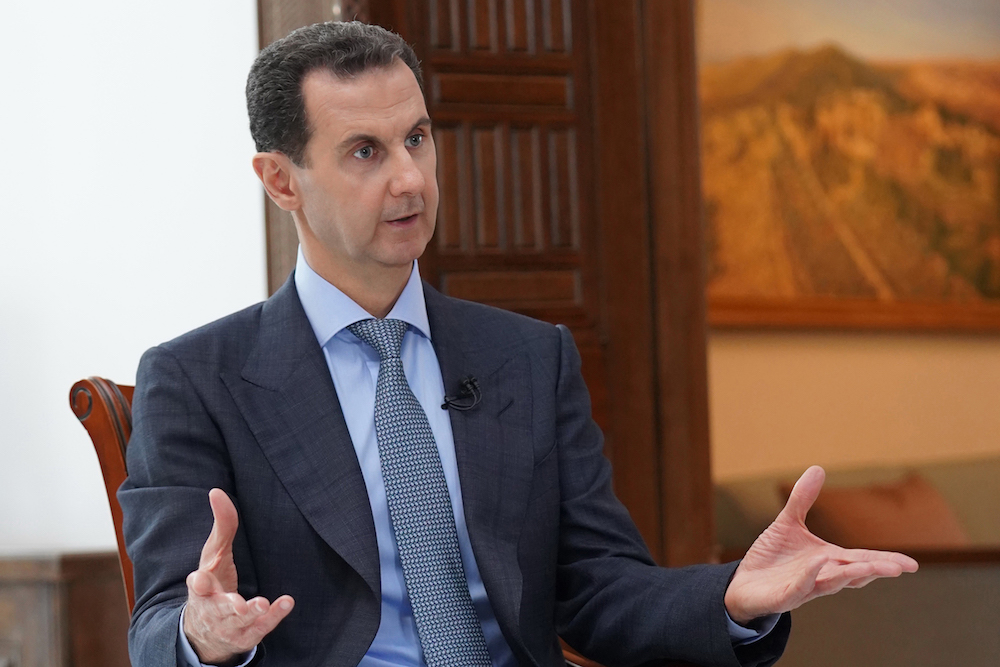
A handout picture released by the official Syrian Arab News Agency (SANA) on March 5, 2020 shows President Bashar Assad speaking during an interview with Russia Today in Damascus. (AFP/File Photo)
In its “Syria m-VAM” survey report, released in April, the World Food Program (WFP) noted that “the availability of food in markets is diminishing and prices are rising as a result of the depreciation of the Syrian pound.”
The report tallied the losses caused by the forced suspension of many economic activities, as well as the partial curfews imposed by the government to prevent the spread of COVID-19.
The report said the restrictions took their toll on jobs and earnings, with 67 percent of households interviewed in Suwayda reporting the loss of one or more sources of income.
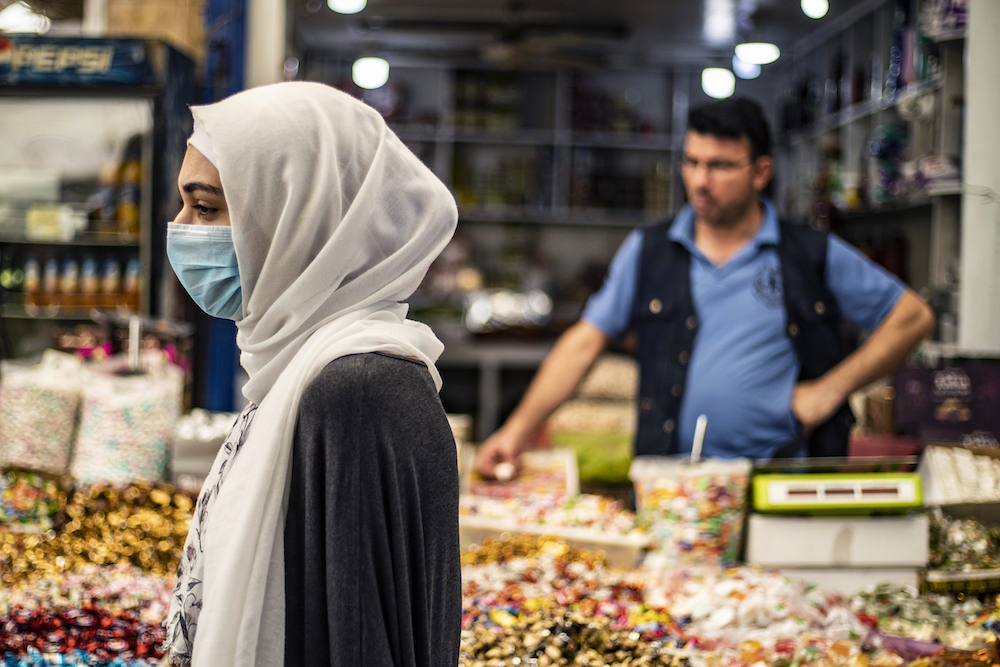
A woman walks past shops at the main market of the Kurdish-majority city of Qamishli in Syria's northeastern Hasakeh province on May 19, 2020. (AFP/File Photo)
Assad issued a decree on June 11 firing Prime Minister Imad Khamis and naming Hussein Arnous, the water resources minister, as his successor.
The order did not cite any specific reason for the dismissal of Khamis, who had been appointed to the top job in 2016.
Just days earlier, in a post on his official Facebook account, Ghassan Fattoum, a former head of the Syria Journalists Union, wrote: “It is strange that there are still those who import and experiment with solutions in hopes of finding the right solution, but we did not and will not reach (a solution) if we continue to churn out a traditional vision that lacks creative solutions for managing the state’s resources in an optimal way.”
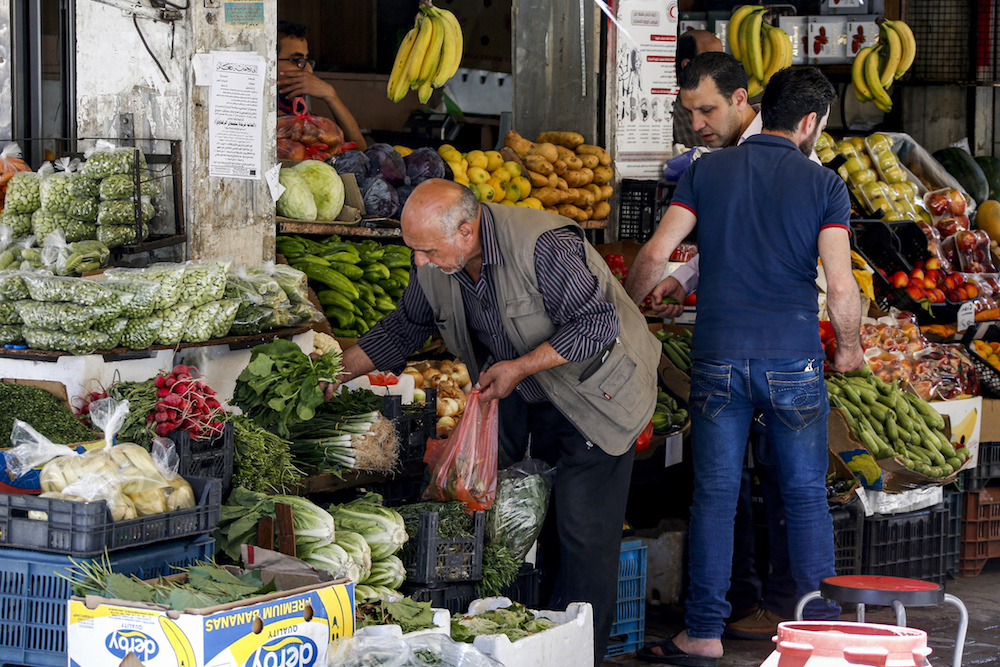
People shop for produce at al-Shaalan market in Syria's capital Damascus on June 10, 2020. (AFP)
Kevin DeJesus, assistant professor at the John Hazen White College of Arts and Sciences at Johnson and Wales University, said he has no doubt that “Syria’s already vulnerable population will suffer further” due to the Caesar Act.
“We’ll witness a deepening and more complex crisis in the country as these sanctions will have economic and humanitarian repercussions,” he told Arab News.
“As time marches on, the effects of this crisis will mirror the dire humanitarian effects of the US sanctions strategy in Iraq, which devastated civilian life while Saddam Hussein retained power.”

People wave Syrian national flags and pictures of President Bashar al-Assad as they gather for a demonstration in support of Assad and against US sanctions on the country, at the Umayyad Square in the centre of the capital Damascus on June 11, 2020. (AFP)
Not even the deadly coronavirus pandemic prompted the West to lift or ease sanctions targeting the Assad regime.
If there is a compelling new case for the same governments to walk their policy back, it has yet to be made by Damascus.
The European Commission published on May 12 a report on its official website that ruled out any negative impact on Syria’s medical response to COVID-19.
Opinion
This section contains relevant reference points, placed in (Opinion field)
“EU sanctions do not prohibit the export to Syria of respirators, disinfectants, hand sanitizers or detergents used to respond to COVID-19,” the report said, adding that traders need to make sure that these goods “will not be used for military purposes or internal repression.”
Syrian Health Minister Nizar Yazigi said the Caesar Act will impede the supply of medical equipment and medicines for chronic diseases by not exempting the Ministry of Economy and Foreign Trade, which is responsible for importing medicines.
At the same time, he added: “There is no shortage of any drug substance (and) although there might be a shortage of certain brands, there are alternatives.”
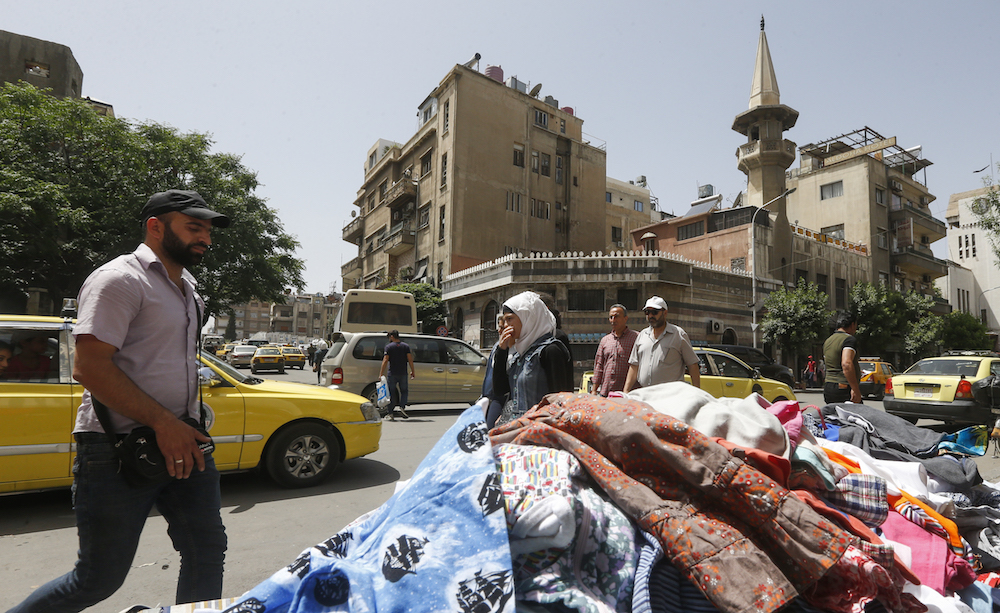
Syrians walk past a second-hand clothes at shop in front of a flea market in the capital Damascus on May 17, 2020, amid severe economic crisis that has been compounded by a coronavirus lockdown. (AFP/File Photo)
Whatever the truth, residents of Damascus have been complaining of medicine shortages since early June, prompting some activists to start a Facebook group titled “Together better,” whose members share the medicines they have but do not use and are willing to give away.
The “Syria m-VAM” report of April noted that “only 57 public hospitals are functioning and there are significant shortages of trained health workers.”
Against a backdrop of what looks like a looming humanitarian crisis, DeJesus believes the tide will turn against the US sanctions.
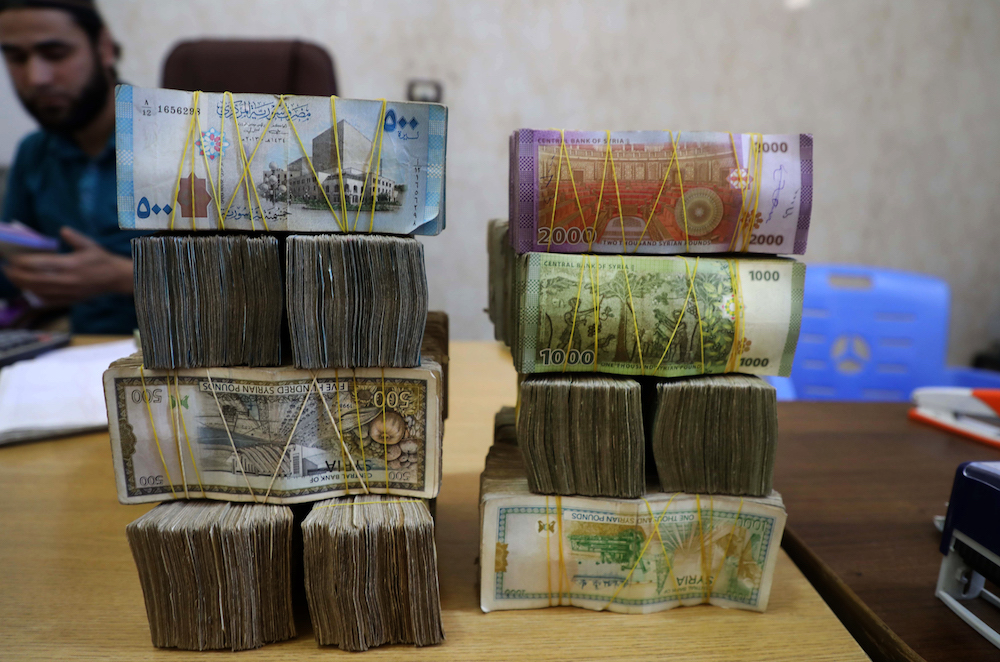
Syrian pounds are pictured at a currency exchange shop in the town of Sarmada in Syria's northwestern Idlib province, on June 15, 2020. (AFP)
“The world will grow alarmed at the deepening hunger, unemployment, collapse of social structures and, crucially, the inability of the large Syrian diaspora to send remittances and development resources to people back home,” he said.
On a geopolitical level, he added, a year from now the US will have further ceded influence to China and Russia.
“Criminal syndicates and black-market economies will flourish, and the network around the Syrian president, which has protected his power, will only hold tighter to that power as they weather this considerable, but not insurmountable, challenge,” DeJesus said.
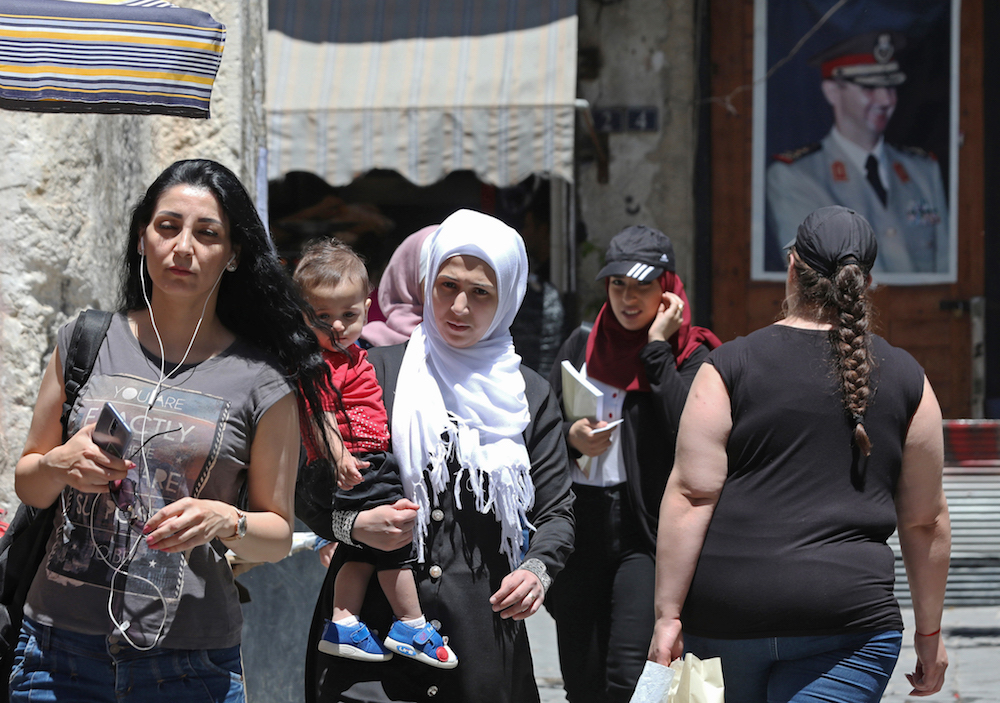
Syrians walk in old Damascus in front of a portrait of Syrian President Bashar al-Assad, on June 16, 2020. - The Caesar Syria Civilian Protection Act of 2019, a US law that aims to sanction any person who assists the Syrian government or contributes to the country's reconstruction, is to come into force on June 17. (AFP)
Camille Otrakji, a Syrian-Canadian analyst, believes the Caesar sanctions will not force Russia to abandon Syria.
“To fully reinstate its superpower status, Russia will need a diplomatic success like a deal to end the decade-long war in Syria,” he told Arab News.
“The Trump administration is saying, both publicly and privately, that it’s interested in a deal, but some US officials are insisting on terms that the authorities in Damascus aren’t willing to accommodate.
“A withdrawal of all foreign troops — except those of Russia — is one possibility. Iran understands that a deal would have to include some degree of attenuation of its presence in Syria.”
Looking to the future, Otrakji said: “There are two significant milestones to watch within the next year: The US presidential elections in November 2020, and the Syrian presidential elections in July 2021.”
----------------



